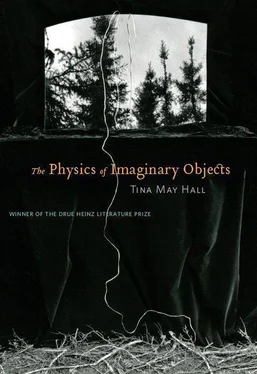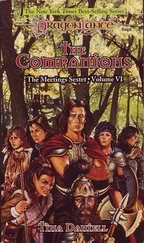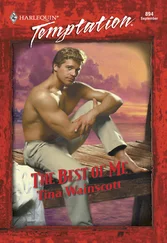Tina Hal - The Physics of Imaginary Objects
Здесь есть возможность читать онлайн «Tina Hal - The Physics of Imaginary Objects» весь текст электронной книги совершенно бесплатно (целиком полную версию без сокращений). В некоторых случаях можно слушать аудио, скачать через торрент в формате fb2 и присутствует краткое содержание. Год выпуска: 2010, Издательство: University of Pittsburgh Press, Жанр: Современная проза, на английском языке. Описание произведения, (предисловие) а так же отзывы посетителей доступны на портале библиотеки ЛибКат.
- Название:The Physics of Imaginary Objects
- Автор:
- Издательство:University of Pittsburgh Press
- Жанр:
- Год:2010
- ISBN:нет данных
- Рейтинг книги:5 / 5. Голосов: 1
-
Избранное:Добавить в избранное
- Отзывы:
-
Ваша оценка:
- 100
- 1
- 2
- 3
- 4
- 5
The Physics of Imaginary Objects: краткое содержание, описание и аннотация
Предлагаем к чтению аннотацию, описание, краткое содержание или предисловие (зависит от того, что написал сам автор книги «The Physics of Imaginary Objects»). Если вы не нашли необходимую информацию о книге — напишите в комментариях, мы постараемся отыскать её.
The Physics of Imaginary Objects,
The Physics of Imaginary Objects — читать онлайн бесплатно полную книгу (весь текст) целиком
Ниже представлен текст книги, разбитый по страницам. Система сохранения места последней прочитанной страницы, позволяет с удобством читать онлайн бесплатно книгу «The Physics of Imaginary Objects», без необходимости каждый раз заново искать на чём Вы остановились. Поставьте закладку, и сможете в любой момент перейти на страницу, на которой закончили чтение.
Интервал:
Закладка:
Second Daughter imagines all the things that could be circling her house with a flashlight. She remembers stories from school of children being cut up and left in the forest. She remembers the wolves and bears and the abused boys who grow up to torture people found via classified ads. Mother says, “Nonsense, that light is too white to be the moon.” Father's brown fingers crush the swan's long throat. The grapes wither a little in their porcelain bowl, roll closer to each other for comfort.
Second Daughter opens the door, and a wind rushes in that is not grandmother's ghost. The light moves away from the window and is lost in the shrubbery. Only Son screams because he knows someday he will sit alone in this same room, hungry and cold. Mother says, “Perhaps he will be a dictator.” Father feeds him a grape. First Daughter holds one finger over the fire and then her whole hand. The swan closes its one yellow eye and tries to remember life before dinner. Father sings a lullaby about three thieves and a serial killer. Mother says, “I believe I am getting a chill.” Mother says, “No one buys the cow when they can get the milk for free.” Only Son moans, and Mother gives him a knife to teethe on. Mother says, “You'll thank me for this later.”
Second Daughter walks outside where everything smells like a ghost. She leaves without her red cloak, without her father's ax, without breadcrumbs for the path home. She has only her proud virginity that clangs like a bell, her will to escape like an egg slipping free, and her curiosity, that strange puss, the part of her brain that claws toward the dark. In the night, in the black fringe of the forest, she could be anyone. She could be the witch sipping boy-blood, the doctor scraping lichen for his collection, the girl who runs and runs and runs.
Gravetending
He was a willful child, brown and plump as a loaf of bread, and was left on their doorstep in the middle of the night. When she heard the wailing, Glynnis poked Frank with the crookhandled cane she kept under the bed for burglars. Brother and sister slept in two single beds with white sheets, plain as nuns' beds, the only adornment in the room a chipped red cabinet someone had brought back from China a long time ago. “You hear that?” she asked, thinking it was probably a rabbit caught in a trap or a cat yowling. When Frank came back holding the baby wrapped in the denim workshirt, it was as if the room cracked open from the heat of the infant's angry forehead.
There was no note, nothing except the grease-stained shirt and the child himself, whom they named Lyndon, a name taken from a headstone near the house. A happy name to counteract the canker, Glynnis thought. A happy grave, always in the sun, covered with a great patch of forget-me-nots that spread like milk over the grass come spring.
They fed the baby with a washcloth dipped in sugar water, as you would a foundling kitten. It was Frank's job to heat the water and test it with his gnarled elbow. They were old when Lyndon came to them, but it was as if they stopped aging that night, as if the steam from the pan of syrup boiling on the stove plumped up all their wrinkles. Glynnis's hair turned dark again and Frank's limp disappeared. Dawn was coming. The baby screamed so hard the stars squinted.
Everyone thought the child was a distant cousin. The brother and sister had no visitors. Glynnis made jam from raspberries that grew in the downhill portion of the graveyard, between the road and the lake. Winters, she made quilts that were sold in the fancy museum in town. It tickled her to think of rich people paying for and sleeping under scraps of her worn-out clothing. The house was a sideways house — white plank, narrow windows — that sat on a strip of lawn between the road and the uphill portion of the graveyard. The hill sloped dramatically up and the graves were terraced, each on their own strip of lawn. There was hardly room for the bodies. Frank and Glynnis knew that many of the caskets were buried into the angle of the hill so that their inhabitants stood up for all eternity. It was Frank's job to dig the graves and cut back the weeds. When the summer storms came, the caskets shifted and holes opened up at the edges of the terrace. Frank tamped earth into the rifts and contemplated the possibility that some day all the caskets would slip down the hill and pop out into the road. Next to the drainage ditch, Glynnis set up an old table and sign and a pyramid of jam jars, three dollars each, honor system.
Lyndon grew up lean, but still brown — brown as a berry, boot leather, the bark of the tree his name mirrored. He went to the village school half days and had a work release, like the kind they give out in prisons, to help Frank tend the graveyard. He learned to subtract from the dates on the headstones; he learned to read from license plates on the cars that shot by the house. He liked geography and arrived at school early to unspool the watery pink and green maps from their rusting shells and trace the vees of the mountain ranges. He could put his finger on any capital city in seconds. The other boys were a bit in awe of this. Geography was an acceptable subject to excel in, unlike music or literature. They called Glynnis a witch and claimed she set her jam with the bones and fingernails of children. Lyndon affected carelessness. He would not be drawn into a fight. If the others shoved him or tore his shirt, his face grew stony and he thought of the Great Salt Lake where even the fattest creatures floated with ease and where the brine shrimp hatched by the millions. The girls in the class cast sidelong glances at him and penned his name over the furrows of their wrists.
At home, they ate mostly fish and bread and bitter greens found by the roadside, boiled down with vinegar and salt. Once in a while, offerings turned up on their doorstep, a wedge of sheep's cheese, a store-bought pie in a foil tin. Glynnis and Frank had no idea why people left things for them; they assumed it had something to do with the cemetery. When Lyndon was a child, Frank taught him how to tie flies and took him to the river to cast. Frank's own father had kept his patterns a secret but had hooked a midge or damsel nymph on his Christmas stocking each year. When their father died, Glynnis found a bank book filled with drawings of flies and notes. Frank buried it in a hole he dug next to his father's grave without opening it. To construct the flies, Frank and Lyndon used horsehair and squirrel tail hair and once, hair from a raccoon run over outside the house. In his pockets, Lyndon kept balls of animal hair that he plucked from the brambles on his way home from school. These hardened into pellets in the wash and Glynnis lined them up behind the framed photos on the mantle, secret trophies. When fishing in the lake, they used bits of rotting meat that Frank kept in a Tupperware in the refrigerator for this purpose. They cleaned the fish on the shore and the entrails floated in the rocking water. It was from Frank that Lyndon learned augury by guts and bird formations. Early snows and droughts and frosts were unmistakable in the scrawl of the geese flying overhead and the drift of the intestines. The weeks before Lyndon had appeared on the doorstep, all the birds had flown in clusters of three.
One morning, during the hour on local history, the other boys wrote Vampire in marker on the back of his jacket that was hanging from his chair. This was one of their riffs, that Frank was one of the undead, that he slept in the graveyard and rose up each night to suck the blood of the local livestock. Skinny, old, shambling Frank! With his drooping trousers and his quiet voice and the sandy hairs covering his arms. Lyndon wished Frank was a vampire; he wished all the cattle would drop dead simultaneously. Glynnis always ended the story of his arrival at their door as an infant by declaring that there were some things thicker than blood. She said this like a joke but always patted him on the head when she said it, even now that he was a grown boy. Lyndon told her he had lost the jacket on a field trip to the state legislature and went cold the rest of the winter.
Читать дальшеИнтервал:
Закладка:
Похожие книги на «The Physics of Imaginary Objects»
Представляем Вашему вниманию похожие книги на «The Physics of Imaginary Objects» списком для выбора. Мы отобрали схожую по названию и смыслу литературу в надежде предоставить читателям больше вариантов отыскать новые, интересные, ещё непрочитанные произведения.
Обсуждение, отзывы о книге «The Physics of Imaginary Objects» и просто собственные мнения читателей. Оставьте ваши комментарии, напишите, что Вы думаете о произведении, его смысле или главных героях. Укажите что конкретно понравилось, а что нет, и почему Вы так считаете.












